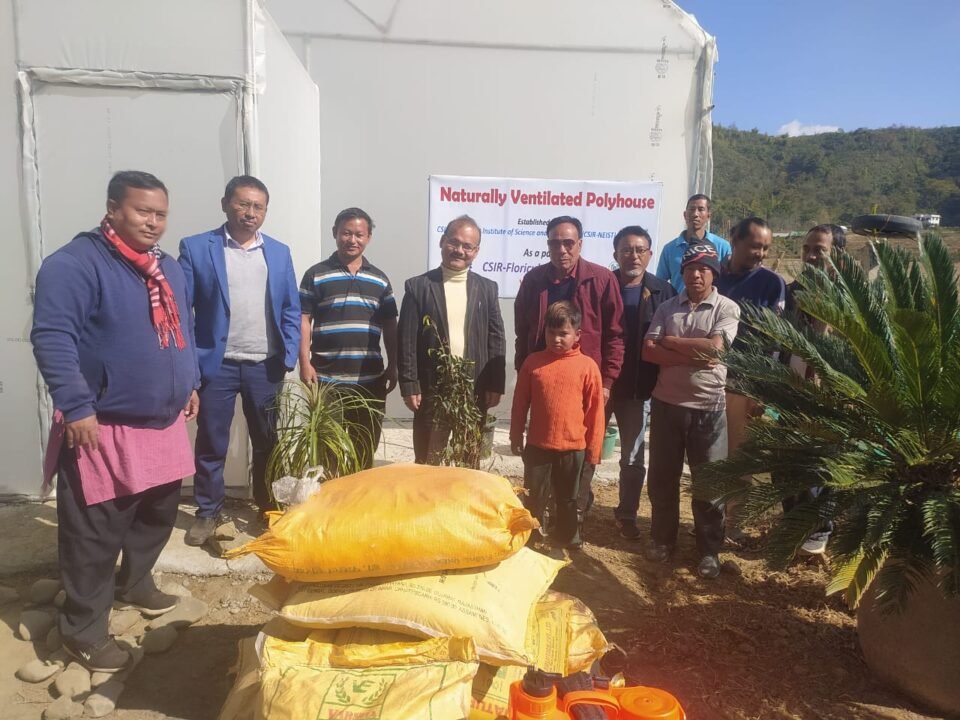HT Bureau
GUWAHATI, April 11: The inauguration function of the three-day ‘Training Programme on Honeybee Keeping and Beehive Making’, which was organised by the Indian Council for Agricultural Research (ICAR), Apunba Imagi Machasing (AIMS) and Yang Honey Promotion Society (YHPS), was held at the Community Hall of the Khamasom Walely Village, Ukhrul district, Manipur on Monday. Dr Rajkumar Ranjan Singh, minister of State, External Affairs & Education, Dr Homen Thangjam, faculty of Indira Gandhi National Tribal University, Kamesh Salam, executive director, South Asia Bamboo Foundation, Judgeson Kasomwoshi, chairman, Khamasom Walely Village Authority, K Vareiyo, president, YHPS and M Khelendro Singh, president, AIMS, graced the function as the chief guest and guests of honours, respectively. Teruaki Watanabe was the special guest, and Dr I. Meghachandra Singh, joint director, ICAR, Lamphelpat, Manipur presided the function. The function was a fusion of virtual and offline one in which various stakeholders from different parts of the world and the Walely villagers participated.
Judgeson Kasomwoshi, as the host of the programme, warmly welcomed the participants. He wished a bright future for the villagers, whom he believed the participants would have learned hands-on during the training and adopt the best practices in the future for a suitable pattern of development for the village.
In his virtual message to the gathering, Dr Ranjan Singh fondly recalled his visit to the village in 2021 in which he declared Khamasom Walely the ‘Honeybee Village of Manipur’. He further recollected the memoirs of the function in which he emphasised the need of popularising the Walely honey through instilling up-to-dated technology in collaboration with ICAR (KVK Ukhrul). He shared that a review of the progress of the venture was the need of the hour to gauge if there has been popular participation by the villagers and how far the mission has progressed. He also appraised how certain members of the Indian Parliament were taking keen interest in promoting organic honey as a source of livelihood means for the rural population of India. For example, he cited how Nitin Gadkari, Union minister of Road and Transport, had been pushing forward the necessity of applying modern scientific technology for improving the livelihood avenues of rural India. He emphasised that such initiative can certainly improve the villagers in Manipur. And according to him, beekeeping and honey production provide such alternative livelihood chances.
Kamesh Salam focused on the need for producing organic honey for sustainable economy through the use of bamboo beehive boxes. According to him, bamboo grows aplenty in Ukhrul district and if the villagers upgrade their craftsmanship in making bamboo bee boxes, this could be another means of earning livelihood income. He further emphasised that Khamasom Walely could enter into collaboration with the National Bee Board of India to have testing centres for organic honey, thereby not only expanding the scope of honey production but also make the village a site of tourist attraction. He wished the village to be the Model Bee Village of India just as Dr. Ranjan had envisioned.
Khelendro Singh representing AIMS stated that much precious natural wealth is lost on account of human misdirection and instantaneous greed. He cited the example of mass poppy plantations in several hill villages which is driven by the phenomenon of ‘easy money’. He cautioned that such ventures in the long run would destroy the natural ecology and lives of the future generation. In such a situation, he shared that looking for alternative livelihood means, which had been practiced by our forefathers infused with modern scientific technology, perhaps, could bring about sustainable development. As such beekeeping is one alternative in which even the womenfolk can participate equally with their male counterparts.
Dr. Homen Thangjam also emphasised on eco-friendly sustainable development. According to him, there would be no food, fruits and seeds without bees, which are the primary agents of pollination. He added that beekeeping can be a sustainable means of earning livelihood and with more efforts and dedication can become a professional occupation thereby increasing the wealth of the village.
Teruaki Watanabe in his brief address as the special guest emphasised on producing organic honey, which carries the potential of being a rich food as well as medicine. He recommended setting up a honey testing centre in the village. He sincerely wished that villagers across the hills of Manipur would refrain from poppy cultivation and take up beekeeping. He also expressed his willingness to import honey from Walely to Japan and provide assistance in quality production processes.
- Vareiyo expressed that for centuries the Tangkhuls of Khamasom had practiced the art of beekeeping. According to him the old generation could positively exploit the conducive environment for bee culture including the natural vegetation, geographical terrain and the climatic condition. Further, honey was widely used for health and medicinal purposes and as an economic enhancer. However, the young generation had abandoned the valuable practice for reasons best known to them. He stressed that beekeeping and associated practices like bee box making still carries the potential of uplifting the economic condition of the village. For him, it is a matter of persistence and dedication.
While proposing the vote of thanks, N Ratan emphasised on the sincerity and integrity of Walely villagers to make the village a destination of eco-tourism and work towards making honey the precious village product of Khamasom Walely. He earnestly thanked all the participants, trainers and sponsors of the programme.







